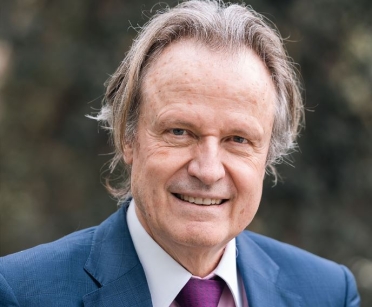Embracing change with ambition
01 Sep 2024
 Tomorrow, Professor Thomas F. Lüscher (Royal Brompton Hospital Imperial College London - London, UK) will begin his 2-year mandate as President of the ESC. But what inspired him to become involved with the ESC and navigate his way to the top?
Tomorrow, Professor Thomas F. Lüscher (Royal Brompton Hospital Imperial College London - London, UK) will begin his 2-year mandate as President of the ESC. But what inspired him to become involved with the ESC and navigate his way to the top?
“One of my first memorable encounters with the ESC was as a young fellow at an ESC Congress in the late-1980s. I narrowly missed out on the best presentation award, but this certainly didn’t put me off. I believe that role models are important for everyone and it was around this time that Paul Hugenholtz was ESC President. He really stood out to me as a true visionary – someone who grasped opportunities and made them happen. Until 1988, ESC Congress took place every 4 years, but he ambitiously suggested making it an annual event. Now, ESC Congress is the leading cardiovascular medicine congress worldwide, his brave move helping to propel it into today’s academic triumph, which also provides income to keep the organisation running.
By 1994 I was Chair of the Working Group of Coronary Circulation. After being Congress Programme Committee Chair in 2002–2003, I went on to become Vice-President. I was responsible for the Working Groups and, under the presidency of Jean-Pierre Bassand, I was privileged to be able to deliver the creation of the first association, the European Heart Rhythm Association. This period marked an important turning point in ESC history, acknowledging the increasing specialisation of our field, while keeping us together under the same umbrella. Our strong backbone currently supports 7 associations, 6 councils and 15 Working Groups, with 57 national cardiac societies and 49 affiliated cardiac societies.
I then began a new chapter of my ESC career as Editor-in-Chief of the European Heart Journal in 2008. Established in 1980, the journal is again a product of ambition – many doubted how well it would fare against US journals, which dominated at that time. Over the 11 years that I was Editor-in-Chief, I am proud that I was able to increase the impact factor from 8.9 to 29.9 and expand the ESC Journal Family to 17 journals, with effective manuscript transfer. As a pleasant ‘side effect,’ the ESC Journal Family is now another important income source. In parallel, I was asked to edit the ESC Textbook of Cardiovascular Medicine with A. John Camm and Patrick W. Serruys. Gerald Maurer joined us for the third edition and we are now preparing for the fourth edition. We are all proud of the success of the online version, ESC CardioMed, and hope to expand it further.
I became ESC Secretary/Treasurer in 2020 and learned about the complexity of the society’s finances. The ESC is a huge enterprise, which continues to grow, but which must always be carefully managed in a balanced fashion. As President-Elect, I chair the ESC’s Governance Task Force and in line with the Strategic Plan 2023–2028, we want to ensure we are doing all we can to be a welcoming society with fair and transparent governance. As part of this, we are currently reviewing our processes so they are relevant now and can adapt with the evolving society and changing environment. We will also soon provide a set of requirements and responsibilities for all leadership positions and board roles.
I was inspired to apply for the presidency by watching my role models take the ESC to new heights. Some of the priorities for my presidency include continuing to navigate the digital transformation of cardiology, for example, helping to facilitate the integration of artificial intelligence as an efficient co-pilot for healthcare professionals in education and clinical practice. Unlocking even more information from our valuable registries with high-quality data science is also key.
Of course, our current work on raising awareness of the impact of cardiovascular disease will continue on the political stage. We hope to build on the momentum created with our Cardiovascular Health Plan submitted during the Hungarian Presidency of the Council of the EU and further foster it when the EU Presidency passes to Poland in 2025. Tackling our increasingly unhealthy environment is part of the issue and we will strive to look at ways to improve the ESC’s own sustainability as well as promote heart-healthy initiatives at a European level and beyond. A highlight for my presidency next year will be ESC Congress 2025 – not only will it celebrate the 75th anniversary of the ESC, but it will also be held in conjunction with the World Congress of Cardiology. This union of two leading cardiology organisations – the ESC and the World Heart Federation – underscores our commitment to fostering the exchange of knowledge, expertise and best practices across the global community.
The ESC is such a fantastic society and it is a privilege to be able to help shape it. We need people with vision and I look forward to working together with an outstanding board to face the exciting future ahead, embracing change with ambition, for the benefit of cardiology and our patients.”


